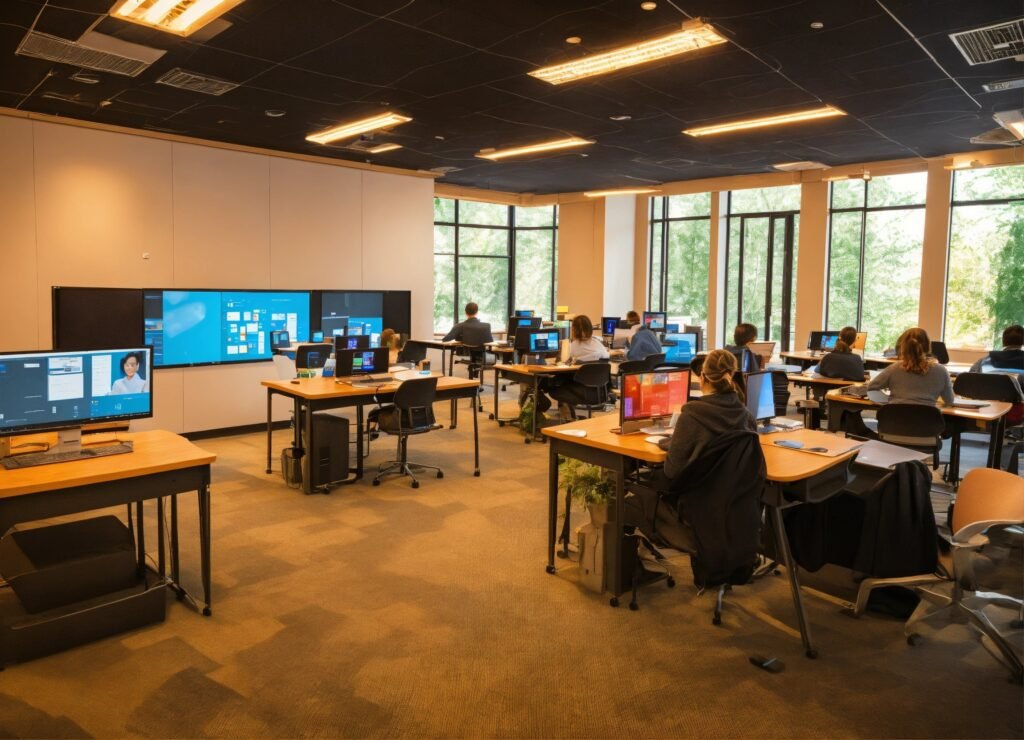Introduction
In today’s digital age, technology plays a crucial role in education, transforming the way students learn and interact with course materials. Campus technology services encompass a wide range of resources and tools provided by universities to support student learning and enhance the overall educational experience. From access to online learning platforms to interactive classroom technologies, these services are designed to empower students and facilitate their academic journey.
II. Accessing Campus Technology Resources
One of the key aspects of campus technology services is the provision of access to various resources and tools. Universities typically offer a suite of software applications and online platforms that students can utilize for their coursework. Additionally, there are computer labs and access points strategically located across campus, providing students with convenient access to technology resources.
III. Utilizing Online Learning Platforms
Online learning platforms have become increasingly prevalent in higher education, offering a flexible and accessible way for students to engage with course materials. These platforms, often referred to as Learning Management Systems (LMS), allow students to access lectures, readings, assignments, and other course materials remotely. They also provide features such as discussion forums, quizzes, and grading tools to facilitate interaction and assessment.
IV. Interactive Classroom Technologies
Interactive classroom technologies play a vital role in modern teaching and learning environments. Smartboards, multimedia projectors, and other interactive displays enable instructors to deliver engaging and dynamic presentations. Classroom response systems, such as clickers or polling software, allow students to participate actively in lectures and provide real-time feedback.

V. Virtual Reality (VR) and Augmented Reality (AR) Applications
Virtual Reality (VR) and Augmented Reality (AR) technologies hold immense potential for enhancing the learning experience. VR simulations can provide immersive, hands-on learning experiences in fields such as science, engineering, and healthcare. AR applications enable interactive visualizations that help students better understand complex concepts in various subjects.
VI. Collaborative Tools and Platforms
Collaboration is a fundamental aspect of learning, and campus technology services offer a range of tools and platforms to facilitate collaboration among students. Online group project management systems allow students to collaborate on assignments and projects remotely. Video conferencing platforms enable synchronous communication and collaboration, making it easier for students to work together regardless of their physical location.
VII. Digital Libraries and Research Databases
Access to academic resources is essential for student success, and campus technology services provide access to extensive digital libraries and research databases. These resources contain a wealth of scholarly articles, journals, books, and other academic materials that students can use for research and study purposes. Library catalog search tools make it easy for students to discover relevant resources quickly and efficiently.

VIII. Technical Support and Assistance
Technical support and assistance are critical components of campus technology services, ensuring that students can effectively use technology resources without encountering major obstacles. Most universities have dedicated help desk services staffed by knowledgeable IT professionals who can provide assistance with software installations, troubleshooting technical issues, and answering technology-related questions. Additionally, universities often offer online tutorials and resources to help students learn how to use technology tools independently.
IX. Accessibility Features for All Learners
Accessibility is an important consideration in education, and campus technology services strive to ensure that all students have access to learning resources and tools. Universities provide assistive technologies and accommodations for students with disabilities, such as screen readers, captioning services, and alternative formats for course materials. These accessibility features help create a more inclusive learning environment where every student can thrive.
X. Data Security and Privacy Measures
Protecting the privacy and security of student data is paramount, and campus technology services implement robust measures to safeguard sensitive information. Universities adhere to data protection regulations and industry best practices to ensure that student information remains confidential and secure. This includes encryption protocols, access controls, and regular security audits to identify and mitigate potential vulnerabilities.

XI. Technology Training and Workshops
To help students maximize the benefits of campus technology services, many universities offer technology training and workshops. These sessions provide students with opportunities to develop essential digital skills and learn how to use specific software applications and tools effectively. Hands-on workshops cover topics such as programming languages, graphic design software, and data analysis tools, empowering students to succeed in an increasingly digital world.
XII. Mobile Applications for Learning on the Go
In addition to traditional desktop and laptop computers, mobile devices such as smartphones and tablets play a significant role in education. Many universities develop mobile applications specifically designed to support student learning and enhance the educational experience. These apps provide access to course materials, communication tools, campus maps, and other resources, allowing students to learn on the go and stay connected with their academic community.
XIII. Feedback and Improvement Mechanisms
Continuous feedback and improvement are essential aspects of campus technology services, ensuring that they meet the evolving needs of students and faculty. Universities solicit feedback from students through surveys, focus groups, and other channels to identify areas for improvement and implement changes accordingly. This iterative process helps enhance the quality and effectiveness of technology services and ensures that they remain aligned with the goals of the academic institution.
XIV. Case Studies: Success Stories from Students
To illustrate the impact of campus technology services on the learning experience, it’s helpful to highlight real-life success stories from students. These case studies showcase how students have leveraged technology resources to enhance their academic journey, overcome challenges, and achieve their educational goals. Testimonials from students who have benefited from campus technology services provide valuable insights into the tangible benefits of these resources and inspire others to take advantage of them.

Conclusion
In conclusion, campus technology services play a crucial role in enhancing the learning experience for students in higher education. By providing access to a wide range of resources and tools, supporting collaboration and accessibility, and ensuring data security and privacy, these services empower students to succeed academically and thrive in a digital learning environment. As technology continues to evolve, universities must continue to invest in and prioritize campus technology services to meet the needs of students and support their educational journey effectively.
FAQs:
- Are campus technology services available to all students?
- Yes, most universities offer technology services to all enrolled students, often included in tuition fees.
- Can I access campus technology resources from off-campus locations?
- Many services, such as online learning platforms and digital libraries, are accessible remotely with proper authentication.
- How can I request technical support for issues with campus technology?
- Students can typically contact the university’s IT help desk via phone, email, or online ticketing system for assistance.
- Are there any costs associated with using campus technology services?
- In most cases, access to basic technology services is included in tuition fees. However, there may be additional charges for specialized software or equipment.
- Are campus technology services secure and compliant with privacy regulations?
- Universities prioritize data security and comply with relevant regulations to protect students’ personal and academic information.
